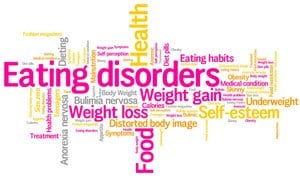Protect your child, teen and yourself
Jennifer Harris, RDN LD CEDRD
Certified Eating Disorder Registered Dietitian
St. Cloud Hospital Behavioral Health Clinic
 National Eating Disorders Awareness Week focuses on the prevention of eating disorders as well as learning more about how to help someone that you suspect may be struggling.
National Eating Disorders Awareness Week focuses on the prevention of eating disorders as well as learning more about how to help someone that you suspect may be struggling.
As we learn more about the reported health risks of high body weight and subsequent concerns about being unhealthy, it comes as no surprise that weight concerns are at an all-time high — even among our children. According to a survey by the National Eating Disorders Association, more than 50 percent of teenage girls and about 30 percent of teenage boys use unhealthy weight control behaviors such as skipping meals, fasting, smoking cigarettes, vomiting and taking laxatives. And it may start earlier than you think. The average age one starts an eating disorder may be as low as 12 or 13 years of age.
Efforts to prevent eating disorders are ongoing. Unfortunately, when it comes to prevention, what seems to be logical in our efforts to prevent eating disorders, or for that matter promote health, actually have the potential to backfire and do harm. If you are considering any type of health promotion or eating disorder prevention endeavor, begin your due diligence here and push yourself to learn what an evidence-based program will entail so that your efforts are not in vain.
If you are worried that someone in your life may have an eating disorder, they may show these signs:
- Preoccupation with weight, food, calories and dieting
- Exercise is an excessive, rigid activity despite fatigue, illness, injury or weather
- Frequent comparison of body image/diet with others
- Withdrawal from activities because of weight and shape concerns
- Disappearing to the bathroom after meals
- Evidence of self-induced vomiting, the use of laxatives, diuretics, diet pills, enemas (such as wrappers, coupons or advertisements)
- Hoarding or stealing food
- Cessation or erratic menstrual cycles
- Fainting, lightheadedness or dizziness not explained by any other medical problem
- Refusal to eat meals with family
- Food rituals (such as eating food in rigid sequence, foods cannot touch each other, eating a very limited variety of foods, cutting food into small pieces, blotting foods with napkins to remove fat)
If your loved one is showing these signs, take the following steps:
- Set a time to talk. Discuss your concerns openly and honestly in a caring, supportive way. Make sure you will be some place away from distractions.
- Communicate your concerns. Share your memories of specific times when you felt concerned about your friend’s eating or exercise behaviors. Explain that you think these things may indicate that there could be a problem that needs professional attention.
- Ask your adult friend/loved one to explore these concerns with a counselor, doctor, nutritionist or other health professional who is knowledgeable about eating disorders. If you feel comfortable doing so, offer to help your friend/loved one make an appointment or accompany your friend on their first visit.
- If your concerns are about your own child, contact the Eating Disorders Program for advice on what to do to get started addressing your concerns.
- Avoid conflicts or a battle of wills with your friend/loved one. If your friend refuses to acknowledge that there is a problem, or any reason for you to be concerned, restate your feelings and the reasons for them and leave yourself open and available as a supportive listener.
- Avoid placing shame, blame or guilt on your friend/loved one regarding their actions or attitudes. Avoid giving simple solutions. For example, “If you’d just stop, then everything would be fine!”
- Express your continued support. Remind your friend/loved one that you care and want them to be healthy and happy.
If you suspect someone you love is showing signs of an eating disorder, don’t delay in consulting with your health care provider or contact the Eating Disorders Program.